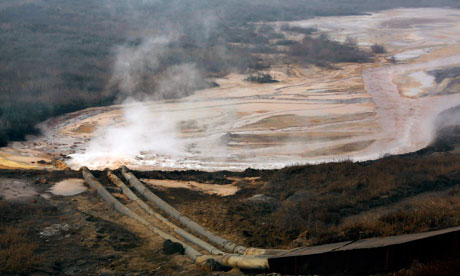
The Chinese State Media has had a mixed reaction to the World Trade Organization’s ruling on Wednesday (the 26th) that China’s caps on exports of rare earth elements are in violation of global trade agreements. The European Union Trade Commissioner Karel De Gucht predictably hailed the decision, stating that the “ruling by the WTO on rare earth shows that no one country can hoard its raw materials from the global market place at the expense of its other WTO partners.” China accounts for 90% of global rare earth element production, thanks largely to the annexation of mineral-rich Tibet in 1951. These metals are essential in the production of wind turbines, electric automobiles, mobile phones, personal computers, and cruise missiles–among many other high-tech goods.
Unfortunately Mr. De Gucht willfully ignores the environmental and public health catastrophe looming in the face of unregulated rare earth element trade. Unscrupulous mining and waste-water disposal practices can result in release of the radioactive element thorium and other toxins into the environment: for separating rare earth metals from their surrounding rocks involves a cocktail of chemicals and generates enormous amounts of waste. On the consumer end, disposal of electronics and failure to recycle components also poses serious environmental risks. Also contrary to Mr. De Gucht’s suggestion, vast stores of the rare earth metals lie in untapped reserves in the US, Australia, Brazil, Eastern Europe, and India, to name a few. Many of these countries halted or delayed extraction to avoid the external costs experienced by China–explaining why it provides 90% of the supply while having just a fraction of global reserves.
An article in the Beijing News (in Chinese), while not directly mentioning the WTO ruling, decried the central government’s environmental stewardship and called for greater regulations on the rare earth element industry. It stated that “once the industry is cleaned up and regulated, prices of exports will reach a reasonable level … it will no longer be possible for the US, EU and Japan to import our rare earth resources at dirt cheap prices.” Of course, export caps are not the most efficient way to internalize the external costs of rare earth element production: better regulations and Pigovian taxation would be ideal if China truly wishes for an optimal outcome, and these would bypass the WTO ruling. But the WTO should also consider all the costs and benefits of its policy–and should thus make rulings taking into account environmental and public health impacts. Karel De Gucht could do without his hypocritical pretension that the US and EU are not free-riding by equally benefiting from the artificially low of price of rare earth metals while China absorbs all the external costs associated with their extraction.
One of the reasons why China is keeping Tibet despite all the social unrest is for the economic gains. As you mentioned above, Tibet provides large amount of resources to China.
Also, I doubt that either China or the WTO takes a step back on this issue. Well.. China might if it can get a better or more efficient way.